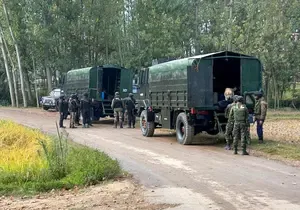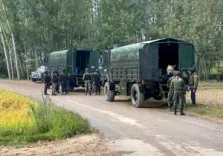What Happened During the Anti-Terrorist Operation in J&K’s Kulgam District?

Synopsis
Key Takeaways
- Two LeT terrorists neutralized
- Two soldiers martyred
- Operation conducted by joint forces
- Focus on dismantling terror ecosystem
- Drug trafficking linked to terrorism
Srinagar, Sep 9 (NationPress) The intensive three-day anti-terror operation in the Gudar forest region of Jammu and Kashmir’s Kulgam district concluded on Tuesday, resulting in the deaths of two notorious Lashkar-e-Taiba (LeT) terrorists. Tragically, two army soldiers also made the ultimate sacrifice in this encounter.
The Chinar Corps, based in Srinagar, reported on Tuesday evening that the operation concluded with the neutralization of two prominent LeT terrorists identified as Rahman, a Pakistani national, and Amir Ahmed Dar, a resident of Daramdora, Shopian. A significant cache of weapons, ammunition, and other military supplies was also recovered.
“#ChinarCorps remains unwavering in its mission to maintain a terror-free Kashmir,” they stated.
Joint forces initiated a Cordon and Search Operation (CASO) in the Gudar forest area of Kulgam district on Sunday after receiving intelligence about the terrorists' presence.
As the forces closed in on the terrorists, they were fired upon, leading to a fierce encounter.
“One terrorist was eliminated during the initial confrontation, while three army personnel, including a junior commissioned officer (JCO), sustained injuries,” officials reported.
“The injured soldiers were promptly transported to the hospital; unfortunately, two of them, Subedar Perbhat Gaur and Lance Naik Narender Sindhu, succumbed to their severe injuries,” they added.
According to hospital officials, the condition of the JCO remains stable.
On Tuesday, Jammu and Kashmir L-G Manoj Sinha paid homage to the two fallen soldiers, and Chief Minister Omar Abdullah attended the wreath-laying ceremony to honor these courageous individuals.
Across Jammu and Kashmir, joint forces have ramped up aggressive anti-terror operations targeting armed terrorists, their overground workers (OGWs), and sympathizers.
Intelligence agencies and security forces assert that true peace in Jammu and Kashmir can only be achieved by fully dismantling the terror ecosystem.
Moreover, drug traffickers and smugglers are now under scrutiny, as it has been established that proceeds from these illegal activities often finance terrorism in the union territory.








